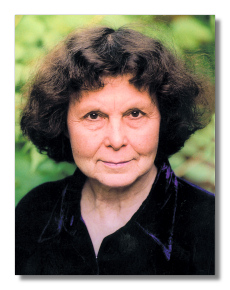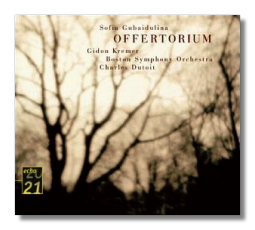
The Internet's Premier Classical Music Source
Related Links
-
Find CDs & Downloads
Amazon - UK - Germany - Canada - France - Japan
ArkivMusic - CD Universe
Find DVDs & Blu-ray
Amazon - UK - Germany - Canada - France - Japan
ArkivMusic-Video Universe
Find Scores & Sheet Music
Sheet Music Plus -
- A Russian Composer's Path To Freedom in The Christian Science Monitor
Recommended Links
Site News
Sofia Gubaidulina

(b. 1931)
Born in Chistopol in the Tatar Republic of the Soviet Union, Sofia Gubaidulina received instruction in piano and composition at the Kazan Conservatory, studied composition with Nikolai Peiko at the Moscow Conservatory, and pursued graduate studies there under Vissarion Shebalin. Prior to 1992 she lived in Moscow, but has since made her primary residence in Germany, outside Hamburg.
Gubaidulina's compositional interests have been stimulated by the tactile exploration and improvisation with rare Russian, Caucasian, and Asian folk and ritual instruments collected by the "Astreia" ensemble, of which she was a co-founder, by the rapid absorption and personalization of contemporary Western musical techniques (a characteristic, too, of other Soviet composers of the post-Stalin generation including Edison Denisov and Alfred Schnittke), and by a deep-rooted belief in the mystical properties of music.
Her dedication to a singular vision did not endear her to the Soviet musical establishment, but her music was championed in Russia by a number of devoted performers including Vladimir Tonkha, Friedrich Lips, Mark Pekarsky, and Valery Popov. The determined advocacy of Gidon Kremer, dedicatee of Gubaidulina's masterly violin concerto, Offertorium, helped bring the composer to international attention in the early 1980s. Gubaidulina is the author of symphonic and choral works, two cello concertos, a viola concerto, four string quartets, a string trio, works for percussion ensemble, and many works for nonstandard instruments and distinctive combinations of instruments. Her scores frequently explore unconventional techniques of sound production.
Since 1985, when she was first allowed to travel to the West, Gubaidulina's stature in the world of contemporary music has skyrocketed. She has been the recipient of prestigious commissions from the Berlin, Helsinki, and Holland Festivals, the Library of Congress, the Chicago Symphony Orchestra, the New York Philharmonic, and many other organizations and ensembles. Among her forthcoming works is a Passion according to St. John commissioned by the Internationale Bachakademie Stuttgart.
Recommended Recordings
Concerto for Violin "Offertorium"
- Concerto for Violin "Offertorium"; Hommage to T.S. Eliot/Deutsche Grammophon 471625-2
-
Gidon Kremer (Violin), Charles Dutoit/Boston Symphony Orchestra
- Concerto for Violin "Offertorium"; Sonata for Violin and Cello "Freue Dich"/BIS CD-566
-
Oleh Krysa (Violin), James DePreist/Stockholm Philharmonic Orchestra














